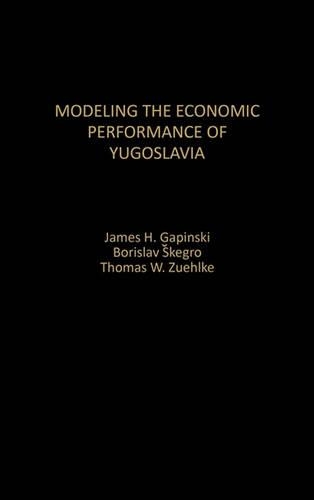
Modeling the Economic Performance of Yugoslavia
(Hardback)
Publishing Details
Modeling the Economic Performance of Yugoslavia
By (Author) James H. Gapinski
By (author) Borislav Skegro
By (author) Thomas W. Zuehlke
Bloomsbury Publishing PLC
Praeger Publishers Inc
24th October 1989
United States
Classifications
Tertiary Education
Non Fiction
Political structure and processes
330.9497
Physical Properties
Hardback
311
Description
The culmination of work begun in 1985, this book posits a comprehensive model to explain the workings of Yugoslavia's economy. The authors have developed a model that is both theoretically oriented and empirically relevant - ensuring its appropriateness for recommending and evaluating alternative policy remedies for the acute problems of inflation, unemployment and foreign trade now facing Yugoslavia, a country until recently noted for its economic successes. Already chosen to represent Yugoslavia in the ongoing international project LINK, a global system for tracking and forecasting the economic conditions of some 80 countries and regions, the model is distinguished by its policy emphasis and by its ability to capture the fundamental divisions of the Yugoslav economy. The book begins by providing background information about Yugoslavia including highlights of the country's economic experience, special features of its economic structure, the composition of its political system, the operation of its finacial system and the behaviour of firms. Part 2 includes four chapters which examine the different components of the Yugoslav economy and review the theoretical basis and empirical performance of the equations which describe those components. A separate chapter presents the complete model, called the EIZFSU Mark 1.0 in recognition of its major sponsoring institutions. In the final part, the model is used to study policies for improving the performance of the economy and obstacles to their implementation. An appendix describes and quantifies the variables used in the model while a list of references provides additional information for the researcher who wishes to pursue further study in this area.
Reviews
Jointly sponsored by the Ekonomski Institut Zagreb and Florida State U., this book develops a model to explain the workings of Yugoslavia's economy--a model appropriate for recommending and evaluating alternative policies for the remedy of inflation, unemployment, and foreign trade problems now facing the nation.-Reference & Research Book News
"Jointly sponsored by the Ekonomski Institut Zagreb and Florida State U., this book develops a model to explain the workings of Yugoslavia's economy--a model appropriate for recommending and evaluating alternative policies for the remedy of inflation, unemployment, and foreign trade problems now facing the nation."-Reference & Research Book News
Author Bio
JAMES H. GAPINSKI is Professor of Economics at Florida State University. BORISLAV SKEGRO is Senior Research Fellow at the Ekonomski Institut Zagreb. THOMAS W. ZUEHLKE is Associate Professor of Economics at Florida State University.
